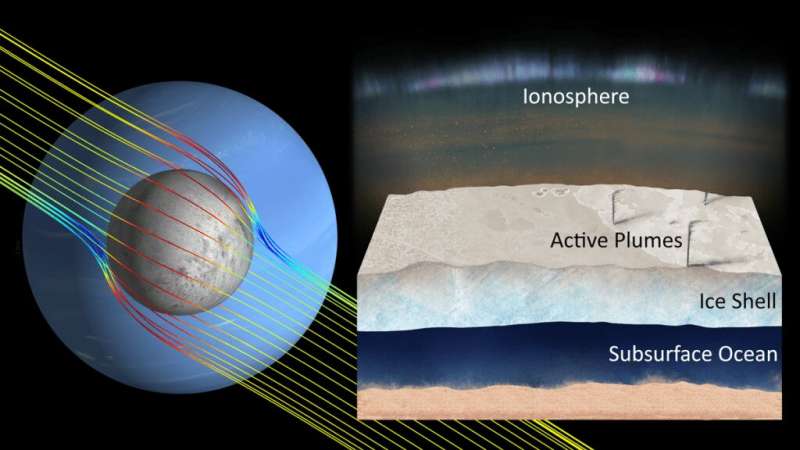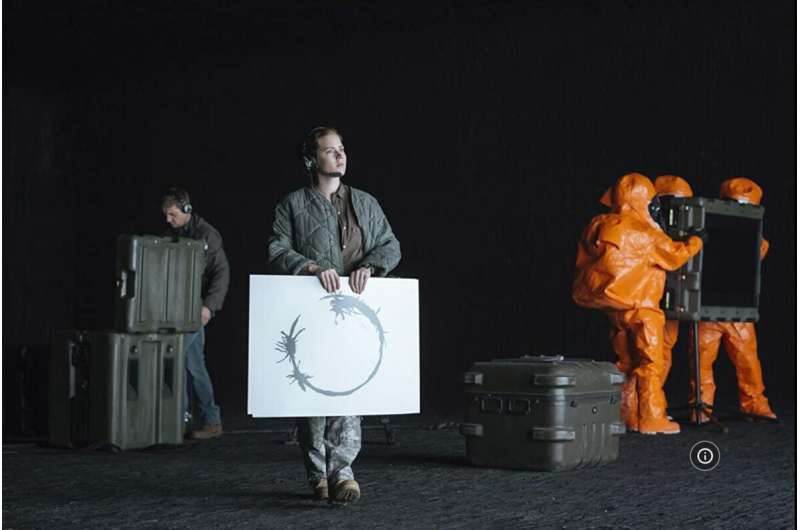
Copernical Team
New research discovers link between disparate approaches to quantum gravity
 A new study by researchers from the International Centre for Theoretical Sciences (ICTS) and the Perimeter Institute for Theoretical Physics (PI) discovers a unifying thread in two approaches to quantum gravity that were previously believed to be separate.
Finding a theory of quantum gravity - which would combine both quantum mechanical and gravitational effects - is one of the great unsol
A new study by researchers from the International Centre for Theoretical Sciences (ICTS) and the Perimeter Institute for Theoretical Physics (PI) discovers a unifying thread in two approaches to quantum gravity that were previously believed to be separate.
Finding a theory of quantum gravity - which would combine both quantum mechanical and gravitational effects - is one of the great unsol Researchers unravel inner workings of galaxy clusters with 196 lasers
 Galaxies rarely live alone. Instead, dozens to thousands are drawn together by gravity, forming vast clusters that are the largest objects in the universe.
"Galaxy clusters are one of the most awe-inspiring things in the universe," said Prof. Emeritus Don Lamb, a University of Chicago astrophysicist and co-author on a new paper published March 9-one that may point the way towards solving a
Galaxies rarely live alone. Instead, dozens to thousands are drawn together by gravity, forming vast clusters that are the largest objects in the universe.
"Galaxy clusters are one of the most awe-inspiring things in the universe," said Prof. Emeritus Don Lamb, a University of Chicago astrophysicist and co-author on a new paper published March 9-one that may point the way towards solving a Mathematical discovery could shed light on secrets of the Universe
 How can Einstein's theory of gravity be unified with quantum mechanics? It is a challenge that could give us deep insights into phenomena such as black holes and the birth of the universe. Now, a new article in Nature Communications, written by researchers from Chalmers University of Technology, Sweden, and MIT, USA, presents results that cast new light on important challenges in understanding q
How can Einstein's theory of gravity be unified with quantum mechanics? It is a challenge that could give us deep insights into phenomena such as black holes and the birth of the universe. Now, a new article in Nature Communications, written by researchers from Chalmers University of Technology, Sweden, and MIT, USA, presents results that cast new light on important challenges in understanding q Massive bubbles at center of Milky Way caused by supermassive black hole
 In 2020, the X-ray telescope eRosita took images of two enormous bubbles extending far above and below the center of our galaxy. Since then, astronomers have debated their origin. Now, a study including University of Michigan research suggests the bubbles are a result of a powerful jet of activity from the supermassive black hole at the center of the Milky Way. The study, published in Nature Ast
In 2020, the X-ray telescope eRosita took images of two enormous bubbles extending far above and below the center of our galaxy. Since then, astronomers have debated their origin. Now, a study including University of Michigan research suggests the bubbles are a result of a powerful jet of activity from the supermassive black hole at the center of the Milky Way. The study, published in Nature Ast Moving right along - slowly but surely during Sols 3409-3410
 We are continuing to slowly move through this very challenging terrain - over the weekend we made it about 4 meters before the drive stopped when the rover sensed more difficulty. The attached image shows the deeper rover tracks over the undulating and rocky terrain, which has given us so much trouble driving and making it frequently unsafe to unstow the arm.
Despite all the challenges, th
We are continuing to slowly move through this very challenging terrain - over the weekend we made it about 4 meters before the drive stopped when the rover sensed more difficulty. The attached image shows the deeper rover tracks over the undulating and rocky terrain, which has given us so much trouble driving and making it frequently unsafe to unstow the arm.
Despite all the challenges, th SpaceX launches 48 Starlink satellites amid Ukraine crisis
 SpaceX launched 48 more of the company's Starlink broadband Internet satellites on Wednesday morning from Florida.
The company's Falcon 9 rocket lifted off as planned at 8:45 a.m. EST into a mostly blue sky from Cape Canaveral Space Force Station. The launch was SpaceX's 10th in 2022.
"Time to let the American broomstick fly and hear the sounds of freedom," a SpaceX launch contro
SpaceX launched 48 more of the company's Starlink broadband Internet satellites on Wednesday morning from Florida.
The company's Falcon 9 rocket lifted off as planned at 8:45 a.m. EST into a mostly blue sky from Cape Canaveral Space Force Station. The launch was SpaceX's 10th in 2022.
"Time to let the American broomstick fly and hear the sounds of freedom," a SpaceX launch contro Virgin Orbit to launch first Welsh satellite from UK Spaceport Summer 2022
 Leading launch company Virgin Orbit (Nasdaq: VORB) and European in-space manufacturing tech start-up Space Forge has announced an agreement to launch the first satellite developed in Wales in summer 2022.
In a historic moment for UK space, the satellite will be launched as part of a broader joint UK-US mission to open the country's first domestic space port in summer 2022 out of Spaceport
Leading launch company Virgin Orbit (Nasdaq: VORB) and European in-space manufacturing tech start-up Space Forge has announced an agreement to launch the first satellite developed in Wales in summer 2022.
In a historic moment for UK space, the satellite will be launched as part of a broader joint UK-US mission to open the country's first domestic space port in summer 2022 out of Spaceport Buzz Aldrin's famous 1969 moon walk picture sells at auction

More than 70 original NASA photographs including a celebrated image of Buzz Aldrin's moon walk taken by Neil Armstrong were sold at auction in Copenhagen on Wednesday for more than 155,000 euros ($172,000).
The Aldrin image, which fetched 5,373 euros, shows the astronaut on the surface of the moon in July 1969 during the first manned lunar landing. It was famously used on the cover of LIFE magazine.
Armstrong, the first man to step onto the Moon, can be seen in the reflection of Aldrin's visor.
A total of 74 NASA photographs were put up for sale including 26 taken on the Moon during the Apollo missions in the 1960s and 1970s.
Finding moons' hidden oceans with induced magnetic fields

In the 21st century, planetary scientists have become increasingly aware that subsurface oceans consisting of liquid water exist within objects throughout the solar system. Because water is a universal requirement for life on Earth, these bodies—mostly moons—are enticing targets in the search for extraterrestrial life.
A primary way of deducing the existence of an unseen ocean is through an induced magnetic field. These fields originate from a unique application of Faraday's law of induction, which states that a time-varying magnetic field creates an electric current when applied to a circuit. Water that is salty enough to remain liquid in cold space environments is very conductive; at the same time, a moon's orbit through a planet's rotating magnetic field exposes the moon to a field strength that varies with time.
How to talk to extraterrestrials

In Steven Spielberg's 1977 film "Close Encounters of the Third Kind," extraterrestrials communicate with humans through a catchy five-note sequence. In Spielberg's 1982 blockbuster "E.T.," a diminutive alien learns basic English from a children's TV show. More recently, in 2016's "Arrival," squid-like visitors use pictograms to make themselves understood to American scientists wielding whiteboards with words.

